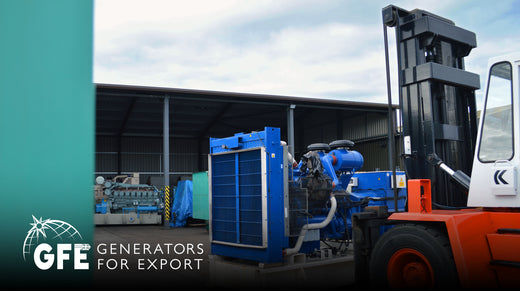Portable vs. Stationary Generators: A Comprehensive Guide
What Are Portable and Stationary Generators?
Generators play a crucial role in ensuring access to reliable power during outages, emergencies, and outdoor events. At Generators For Export, we understand that choosing the right type of generator can be overwhelming. Here, we delve into the key distinctions between portable and stationary generators to help you make an informed decision.
Definition of Portable Generators
Portable generators are compact, lightweight machines designed for mobility and versatility. Equipped with wheels or fixed to a purpose built trailer, they’re easy to transport and set up. These generators typically run on petrol, making them a convenient option for temporary power needs.
Common Use Cases:
-
Outdoor events: Powering sound systems, lights, or food stalls.
-
Camping trips: Charging devices or running small appliances.
-
Emergency backup: Providing short-term electricity during outages.
Portable generators excel in delivering power wherever and whenever you need it, making them indispensable for on-the-go scenarios. Explore our range of Trailered Generators.
Definition of Stationary Generators
Stationary generators, also known as standby generators, are permanently installed units designed for long-term, reliable backup power. These generators are typically powered by diesel or petrol and are connected directly to your home or business’s electrical system.
Key Features:
-
Automatic start during power outages when paired with an Automatic Transfer Switch.
-
Larger fuel tanks for extended operation.
-
Integration with transfer switches to manage electrical loads seamlessly.
Stationary generators are ideal for protecting your property and ensuring business continuity during prolonged outages.
Key Differences Between Portable and Stationary Generators
Understanding the differences between these two types of generators can help clarify which option is best suited to your needs.
Design and Installation
Portable Generators:
-
Lightweight and easy to move.
-
Require minimal setup, often involving plugging into appliances or a manual transfer switch.
-
Compact design makes storage straightforward.
Stationary Generators:
-
Permanently installed on a fixed site.
-
Professional installation is required, including wiring and connection to a fuel source.
-
Often housed in weatherproof enclosures to withstand outdoor conditions.
While portable generators excel in flexibility, stationary models provide a seamless and hassle-free solution for consistent power.
Power Output and Capacity
Portable Generators:
-
Designed for smaller loads, such as powering a few appliances or tools.
-
Output typically ranges from 1kVA to 10kVA.
Stationary Generators:
-
Capable of handling higher power demands, suitable for large homes, businesses, or industrial sites.
-
Output ranges from 10kVA to several thousand kVA.
For those requiring substantial power output, stationary generators are the clear choice.
Cost and Maintenance
Portable Generators:
-
Lower upfront cost.
-
Higher ongoing maintenance due to frequent use and manual operation.
Stationary Generators:
-
Higher initial investment.
-
Lower maintenance frequency with automated systems for self-checks and servicing reminders.
Advantages of Portable Generators
Portable generators offer a range of benefits for users seeking flexibility and affordability.
Flexibility and Mobility
Portable generators’ lightweight design makes them ideal for various locations. Whether you’re hosting an outdoor event or addressing a temporary power outage, their versatility ensures they can adapt to diverse scenarios.
Affordability
For those on a budget or with infrequent power needs, portable generators provide a cost-effective solution. Their lower initial cost makes them accessible for households and small businesses alike.
Advantages of Stationary Generators
Stationary generators shine in their ability to deliver reliable, high-capacity power with minimal intervention.
Reliable Backup Power
These generators automatically activate during outages, offering peace of mind and uninterrupted power. Ideal for areas prone to frequent or prolonged disruptions, stationary generators keep essential systems running without a hitch.
Greater Power Capacity
With their robust design, stationary generators can power entire properties, including HVAC systems, industrial machinery, and more. Their scalability makes them suitable for high-energy demands in commercial or industrial applications.
Choosing the Right Generator for Your Needs
Selecting the right generator involves assessing your specific requirements and understanding which features align with your needs.
Factors to Consider
-
Power requirements: Determine how much electricity you need during an outage.
-
Frequency of use: Portable generators are better for occasional use, while stationary generators suit frequent or long-term needs.
-
Budget: Consider both the upfront cost and ongoing maintenance expenses.
-
Fuel type and availability: Ensure you have access to the required fuel.
-
Noise levels: Evaluate the noise output, especially for residential areas.
-
Space availability: Stationary generators require a designated installation area.
Why Choose Generators For Export?
At Generators For Export, we specialise in providing a wide range of high-quality generators tailored to your needs. Whether you’re looking for the flexibility of portable units or the reliability of stationary systems, our expert team is here to guide you every step of the way. Contact us today to explore our inventory and find the perfect power solution for your requirements.
How can Generators For Export solve my power requirements?
Contact Generators For Export, we can find the best solution for your power needs. We have the power solution for you!
Call: +44(0)1386 553344 | Email: sales@gfe.uk.com

